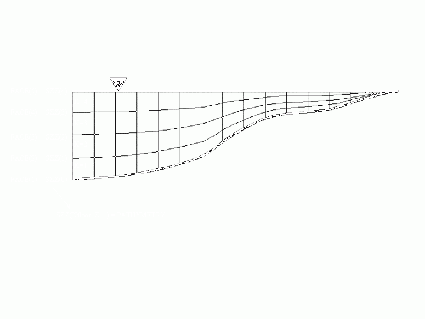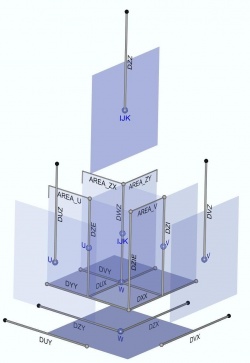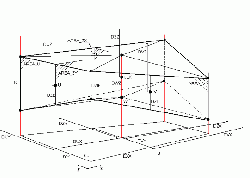Difference between revisions of "Module Geometry"
From MohidWiki
(→Keywords) |
(→Keywords) |
||
| Line 57: | Line 57: | ||
WINDOW : 0/1 [0] !1 Avoid check bottom depth and geometry consistency | WINDOW : 0/1 [0] !1 Avoid check bottom depth and geometry consistency | ||
| − | |||
IMPERMEABILITY : 0/1 - !Consider impermeable cell faces | IMPERMEABILITY : 0/1 - !Consider impermeable cell faces | ||
Revision as of 16:52, 8 May 2012
Contents
Overview
Module Geometry handles the vertical discretization in MOHID. It was designed to divide the water column (in MOHID Water) or the soil compartment (in MOHID Land) in different vertical coordinates: Sigma, Cartesian, Lagrangian, Fixed Spacing, Harmonic, etc. A subdivision of the vertical domain into different sub-domains using different vertical coordinate systems is also possible.
General options
- Minimum depth
Vertical coordinate system
Sigma
Cartesian
The Cartesian coordinate can be used with or without shaved cells. Cartesian builds layers from bottom to top with fixed depth of each layer with the possibility of colapsing layers from top to bottom. This hapens if for example water level reduces. The bottom layers are the last to colapse.
Fixspacing
The Fixed Spacing coordinate allows the user to study flows close to the bottom.
Lagrangian
The Lagrangian coordinate moves the upper and lower faces with the vertical flow velocity.
Harmonic
The Harmonic coordinate works like the Cartesian coordinate, just that the horizontal faces close to the surface expand and collapse depending on the variation of the surface elevation. This coordinate was implemented in the geometry module to simulate reservoirs.
Fixsediment
SigmaTop
Cartesiantop
Cartesiantop is equal to cartesian but builds layers from top to bottom. This type of coodinates are used for Mohid Land. The top is the topography and the bottom is the non-porousmedia (rock). This means that in lower depth soils there will be less layers than in higher depth soils.
Distances
Public routines
- ModuleHorizontalGrid
- GetHorizontalGrid(HorizontalGridID, XX_IE, YY_IE, XX_Z, YY_Z,XX_U, YY_U, XX_V, YY_V, XX_Cross, YY_Cross, DXX, DYY, DZX, DZY, DUX, DUY, DVX, DVY, XX, YY, XX2D_Z, YY2D_Z, STAT)
- ModuleGeometry
- GetGeometryDistances(GeometryID, SZZ, DZZ, DWZ, DUZ, DVZ, DZI, DZE,ZCellCenter, ActualTime, STAT)
Areas
Volumes
Bathymetry consistency diagnostic
Once the vertical discretization is imposed and the bathymetry is chosen, the bottom layer can yield stability problems when using shaved cells. You can have very thin bottom cell next to a very wide bottom cell. To diagnose the existence of such problematic cells, a geometry diagnostic tool was developed.
Input data file
Keywords
WINDOW : 0/1 [0] !1 Avoid check bottom depth and geometry consistency
IMPERMEABILITY : 0/1 - !Consider impermeable cell faces
IMPER_COEF_U : real [1] !
IMPER_COEFX_U : real [0] !
IMPER_COEF_V : real [1] !
IMPER_COEFX_V : real [0] !
<begindomain>
ID : int - !Domain ID
TYPE : char - !Type of vertical coordinate of the domain
!Multiple options: FIXSPACING, SIGMA,
!LAGRANGIAN, CARTESIAN, HARMONIC, FIXSEDIMENT, CARTESIANTOP.
LAYERS : int - !Number of layers
EQUIDISTANT : real [0] !Equidistant layers spacing in meters
LAYERTHICKNESS : real vector - !If not equidistant specifies layers thickness
!starting from bottom layer (e.g. 50. 20. 10. 5.)
TOLERANCEDEPTH : real [0.05] !Just for SIGMA,ISOPYCNIC, LAGRANGIAN coordinates
TOTALTHICKNESS : real - !Total domain thickness
!(Just for FIXSPACING, FIXSEDIMENT, SOIL_TOPLAYER)
EMPTY_TOP_LAYERS : int [0] !Number of empty layers counting from top
DOMAINDEPTH : real
<enddomain>



